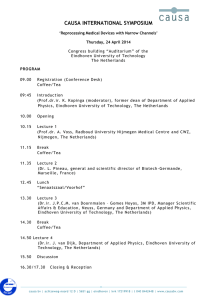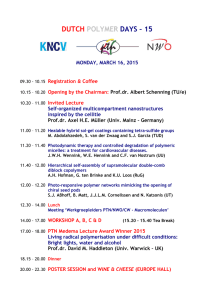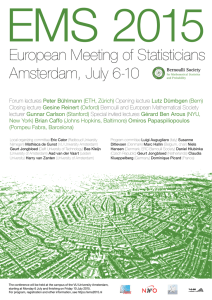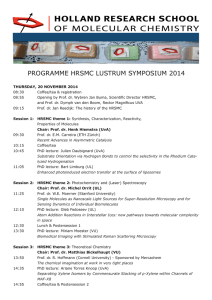No Name Lecture/Workshop Description Rudi Vranckx Het gezicht
advertisement
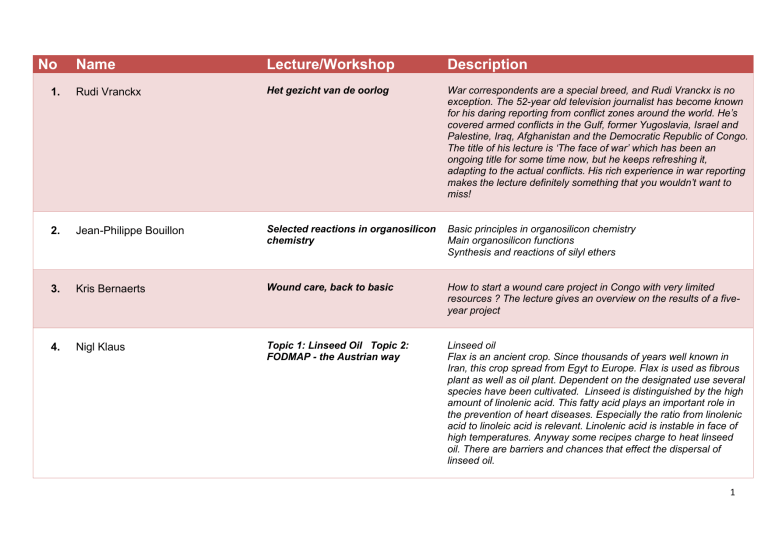
No Name Lecture/Workshop Description 1. Rudi Vranckx Het gezicht van de oorlog War correspondents are a special breed, and Rudi Vranckx is no exception. The 52-year old television journalist has become known for his daring reporting from conflict zones around the world. He’s covered armed conflicts in the Gulf, former Yugoslavia, Israel and Palestine, Iraq, Afghanistan and the Democratic Republic of Congo. The title of his lecture is ‘The face of war’ which has been an ongoing title for some time now, but he keeps refreshing it, adapting to the actual conflicts. His rich experience in war reporting makes the lecture definitely something that you wouldn’t want to miss! 2. Jean-Philippe Bouillon Selected reactions in organosilicon chemistry Basic principles in organosilicon chemistry Main organosilicon functions Synthesis and reactions of silyl ethers 3. Kris Bernaerts Wound care, back to basic How to start a wound care project in Congo with very limited resources ? The lecture gives an overview on the results of a fiveyear project 4. Nigl Klaus Topic 1: Linseed Oil Topic 2: FODMAP - the Austrian way Linseed oil Flax is an ancient crop. Since thousands of years well known in Iran, this crop spread from Egyt to Europe. Flax is used as fibrous plant as well as oil plant. Dependent on the designated use several species have been cultivated. Linseed is distinguished by the high amount of linolenic acid. This fatty acid plays an important role in the prevention of heart diseases. Especially the ratio from linolenic acid to linoleic acid is relevant. Linolenic acid is instable in face of high temperatures. Anyway some recipes charge to heat linseed oil. There are barriers and chances that effect the dispersal of linseed oil. 1 Recipe composition and cooperation between local manufacturers and scientists may help delivering innovative and healthy products containing linseed oil. As olive oil is well known in the southern part of Europe because of its taste and fatty acid composition, linseed oil could play a more important role in colder climate regions in Europe. FODMAP The FODMAP concept is well known in australia. Fermentable Oligosaccharides, Disaccharides, Monosaccharides and Polyols are avoided. An austrian group of dietitians and medical doctors tried to move the concept towards Austria. Typical austrian food has been analysed and the FODMAP content was compared with the data from Australia. A concept of treatment has been developed including medical treatment and dietary treatment for both patients with irritable bowel syndrome and people working within the medical and dietetic therapy. Travaux pratiques de Microbiologie générale Etude de tests qui permettent l'identification des bactéries : métabolisme bactérien et pouvoir hémolytique. Goalsetting at 8000 meter Climbing 8000m peaks is all about preparation, physical endurance but most of all, mental focus... 5. Evelyne Menne 6. Stef Maginelle 7. Daniela Wewerka-Kreimel Project GAAS – Project to promote health competences in NEETyouth 8. Barbara Kohlmaier Nutrition in the elderly Basic lecture for dietetic and nursing students. 2 Wat is giftig? Inleiding in de algemene toxicologie. In de lezing zal eerst worden besproken wanneer een stof giftig genoemd kan worden, en zullen als voorbeeld enkele bijzonder giftige stoffen worden voorgesteld. Maar in onze samenleving speelt met name de chronische toxiciteit van bepaalde stoffen een grote rol. Daarbij kan het gaan om accumulatie van de stoffen zelf in ons lichaam, zoals bij lood, maar ook om accumulatie van beschadigingen aan het DNA die uiteindelijk kunnen leiden tot het ontstaan van kanker. Vervolgens zal worden gekeken naar welke stoffen verantwoordelijk zijn voor een acute vergiftiging bij kinderen en volwassenen. 10. Manuela Graf The making of Tissue Micro Arrays Tissue Micro Arrays are gaining importance within Research Settings but also within Routine laboratories. The power of a TMA to deliver results on a vast mix of samples in one Paraffin block is massive. I would like to Show how a TMA is made and what steps Need to be done in the preparation Phase and what Needs to be considered after completing the block. 11. Christine Lockey The history of public health in the UK A short description of the evolution of public health in the UK. 12. “The truth is rarely pure and never simple” Philosophy of science at work I would like to talk about selected topics from the philosophy of science. The aim would be to probe students to think differently about certain aspects of science. These topics will most likely receive attention in the lecture: inductive and deductive reasoning, logic reasoning, falsification, causation. If certain aspects are already being taught in one of more of your curricula, it would be good if you can inform me about this. How to calculate food climate effects in meu planning tools ? The potential of climate improvements from better selection of meal components is considerable, considering that food consumption accounts for 25% of the consumer driven climate effects in 9. Paschal Oude Weerning Patrick Uiterweerd 13. Mette Grefsrud Persson 3 Sweden, and that 3 million meals are being served in the public sector every day. The project “Climate data for conscious choice of food raw materials” was supported by the region of Västra Götaland and a number of organizations serving public meals to establish a database from which municipalities, city councils and regions can systematically track the climate effects from raw materials. The project objective has been to implement a climate module within the meal planning tools that are used today for the planning of public meals. 14. Marianne Nielsen Digital imaging A lecture (Title: Denmark here I come....) on exchange possibilities to Denmark for Biomedical laboratory scientist and maybe nurses. A workshop for the Biomedical laboratory science students as part of the BLS week. 15. Pedro González Muniesa Twenty-First Century Nutrition: Nutrigenetics and Nutrigenomics The world is evolving rapidly and science with it. In this sense, a new concept based on the "omics" techniques has been developed, Personalized Nutrition or Precise Nutrition. This concept is the future of Nutrition and Medicine as many countries have assured. 16. New ideas how information technology can help health care and ageing In workshop information technology students from Lahti and health care students from Leuven do together (via Adobe Connect Pro ACP) a teamwork generating new ideas for health care with IT support. Teams will introduce their work for each other via ACP at the end of the workshop. Presentation of Biomedical laboratory science programme I will give a lecture on the programme, and the pedagogic projects I have currrently, development of an OSPE (objective structured practical examination). Marianne Matilainen 17. Catharina Hultgren 4 I will also take part in a workshop we suggest to "Investigate and compare laboratory diagnostic methods in countries with similar or different social-economical conditions" or "quality assurance in an international perspective". 18. Eva Sillerström Workshop : Investigate and compare laboratory diagnostic methods in countries "Investigate and compare laboratory diagnostic methods in countries with similar or different social-economical conditions" "quality assurance in an international perspective" 19. Jan van Stam Colloids, Emulsions, and Macromolecules. Examples of Applied Physical Chemistry Physical chemistry is something you encounter in several scientific fields, among which chemistry, physics, pharmacy, and biotechnology should be mentioned.In my lecture, I will give examples of applied physical chemistry for systems characterised by their small size, at least in one dimension. 20. Jo Thomas 21. Martin Buxbaum Presentation Techniques Focus on three main aspects: the audience, body language, question handling. 22. Kirsten Neymark Being a trainee in Denmark – Possibilities at MUC, Department Nursing The workshop would cover a presentation of Denmark, Metropolitan University College, the Danish nurse education and Exchange possiblities. 23. Lacerda Nobre, Angela Do-it-yourself global citizenship: just do it Be ready, Life is a risky business. Bet on secure assets And on safe heavens. 5 Fight for lost causes; You can never fail. No matter how small, Your contribution is always a plus. Be ready, Stick to larger than life projects. Be ready, Just do it. 24. Sigita Svediene The place of soil analysis in the environment monitoring 25. Mirjam Palsma Communicatie in de zorg Climate change, environmental pollution are terrible problems of our days. Environmental monitoring becomes more and more actual in each country. The soil pollution control is a part of environment monitoring. Soil is one of the important components of each urban habitats. Specialists in various areas unanimously agree that the chemical composition of the soil affects human health. In particular focus on the heavy metals in the soil, as they and other non-biodegradable compounds accumulate in the soil for centuries, with heavy rainfall falls to ground and surface waters, with vegetables and fruit grown, inhaling dust go directly into the human body. 26. Danuta Gajewska DASH diet in the prevention and management of hypertension After complete the course students will be able to identify nutritional risk factor related to hypertension and to plan diet based on DASH diet eating plan. 27. Obesity and overweight, the current epidemic Causes, consequences, therapy and prevention of obesity epidemic Minse de Bos Kuil 6 Treatment of diabetes type 2 - meal planing with exchange list system Type 2 diabetes is now one of the most common health problems worldwide. Adequate nutrition is a prerequisite for the success of therapy: normalization of glucose level and other biochemical parameters, as well as the prevention of complications of the disease. At the workshop, students will learn about dietery treatment of diabetes and will plan the adequate menu for patients with diabetes using dietary exchanger system. 29. Serge Pieters History and perspectives of the Space Food program The interest of this topic is to inform students about the development of the space food program from the first meal of Youri Gagarine to the actual menu in the International Space station. To describe the nutritional problem of a long journey in space. And explain our work at ESA to develop the MELiSSA program, short for Micro-Ecological Life Support System Alternative, is an artificial ecosystem to recover food, water and oxygen from waste, carbon dioxide. 30. Jan Van Ende "Pathogenetische studies / Lichaamsgebeuren en neurose" Viktor von Weizsäcker (1886-1957), Duits internist, neurofysioloog, psychotherapeut en filosoof staat bekend als grondlegger van de medische antropologie. Met aandacht voor het medisch denkkader van de natuurwetenschappen (het “ontische”) maar tegelijk, steeds bereid dit objectieve weten achter zich te laten, zoekt hij naar nieuwe sporen, andere invalshoeken, andere mogelijkheden. Hierin probeert hij de zieke en zijn ziek-zijn te laten spreken, vanuit het passionele van het leven en gericht op het in beweging zetten van de pathologie (het “pathische”). Von Weizsäcker probeert zowel het lichamelijke proces te interpreteren door het psychobiografische als het psychobiografische doorheen het lichamelijke. Wat is ziek zijn? Hoe staat de zieke in zijn ziekte? In welke wederkerige wisselwerking verhouden psyché en soma zich? Wat is de betekenis van het ziek-zijn in de geschiedenis van het subject ? Hoe kunnen we de ‘psycho- somatiek’ denken?... zijn slechts enkele van de vragen die zijn oeuvre tekenen en hem drijven in zijn werk als geneesheer. 28. Joanna Myszkowska-Ryciak 7 Het ontische en het pathische, de crisis en de beslissing zijn centrale begrippen in het werk van Viktor von Weizsäcker. Aan de hand van drie casussen (diabetes mellitus, braken en een geval van hemiplegie) proberen we deze begrippen duidelijk te stellen en zoeken we naar een betekenis in deze particuliere manier van ziek zijn. 31. Mohammed Ridouani Dealing with interculturality 32. Peter Plasqui An experience of a first mission with MSF: Alhamdulillah. Plasqui brengt een zelfgemaakte film die een ervaring weergeeft van een eerste missie met artsen zonder grenzen. De kijker krijgt niet zozeer de kant van het slachtoffer maar eerder het perspectief van een hulpverlener te zien. Het gaat om een soort verfilming van het dagboek van Plasqui. 33. Mieke De Pril Pain? Not only medication…The role of the nurse in palliative care. In this lesson/workshop you can learn what is total pain, how you can do an assessment, how to manage chronic malignant pain, how you can give morphine, how much you can give for breakthrough pain and incidental pain, how you can switch from one medication to another, how you can give the most comfort in a palliative situation,… 34. Herman Baerten Belgian law on euthanasia Belgium is one of the 3 countries in the world having a law on euthanasia. During this presentation, the conditions and procedure of this law will be explained. Problem issues, based on practical cases, will be discussed as well. 35. Katrien Ruytjens Introduction to health ethics and ethics of care End of life decisions confront us with challenging ethical and existential questions. In this lecture, I will present –after a general introduction in ethics- two major approaches in medical ethics. Principal biomedical ethics is a dominant approach and provides us with a framework for value clarification and value based decisions. 8 The lecture will give a historical insight with ample examples in the ethical considerations regarding end-of-life decisions. In a second part, the lecture will elaborate on the significance of emotions and experiential ethics. The approach ‘Ethics of care’ focusses on a nursing and caring approach, where vulnerability and reciprocity in caring relationships is crucial. 36. Koen Devriendt Why do Europeans get cystic fibrosis and Africans sikkle cell anemia? Evolution and medicine. 37. Jan Van Passel Presentation of the Bachelor After Bachelor Programme North-South 38. 39. 40. 41. 9
